- Home
- Georgette Heyer
The Quiet Gentleman Page 27
The Quiet Gentleman Read online
Page 27
‘But surely Martin would not –’ began Miss Morville, and broke off short, looking from Ulverston to St Erth, in mute question.
‘No telling what a young fool like Martin would do!’ said the Viscount. ‘Might not have thought anything of it, if I hadn’t seen this Leek earwigging that groom today! As it is – did see it! Made me think, Ger! Made me add two and two together!’
‘But, Lucy, you know you cannot add two and two together!’ expostulated Gervase. ‘Whenever you have computed your debts, you have always reached a false total! Why don’t you ask Martin why he has taken this strange individual into his service?’
‘Martin and I don’t exchange any more words than we need!’ replied the Viscount grimly. ‘Daresay he knows what I think! Don’t mind if he does!’
‘What a happy party must assemble for dinner each evening!’ remarked Gervase, watching the play of the candlelight on his emerald signet-ring.
‘You may well say so! And when your cousin has left us, we shall have no one but that prosy parson to keep our conversation alive!’ said the Viscount.
‘Does Theo mean to leave Stanyon?’ asked Miss Morville quickly.
‘Why, yes!’ answered the Earl. ‘My affairs, you know, cannot be for ever left at a stand! He returns to Evesleigh tomorrow. Now, if only I could prevail upon Lucy to go to London – not that I wish to appear inhospitable –’
‘Spare your breath!’ recommended Ulverston. ‘If he were not assured that I have no intention of leaving Stanyon at this present, your cousin would not stir from here, let me tell you!’
‘You have both told me so, and I have nothing to do but to reply that you are very welcome – if mistaken!’
‘That,’ said the Viscount, ‘we shall see, Ger!’
Nineteen
The Viscount was not the only person to look askance upon Martin’s new valet. Turvey, when he undressed his master that evening, informed him that the Castle had a fresh inmate. His tone contrived to convey the additional information that Mr Leek was scarcely the type of man with whom he was in the habit of associating. ‘If I may venture to say so, my lord, a strange Individual for Mr Martin to take into his service. Very different from Studley, who, although scarcely conforming to Our standards, I have always found to be a most respectable person. Besides having quite a Way with Mr Martin’s boots,’ he added, as one giving honour where it was due. ‘Of course, my lord, the same results as We achieve are not to be obtained, as I had occasion to tell him, through the use of mere blacking; but when one takes into account the very meagre means at his disposal he did very well – very well indeed! It is to be hoped Mr Martin will not be disappointed in his new man. More I will not say.’
‘Whatever else I may believe, that I do not!’ said the Earl.
‘I hope, my lord,’ said Turvey, skilfully rolling the bandage he had removed from about the Earl’s chest and shoulder, ‘that I am not one to cast aspersions upon others; and if Studley’s sudden removal from the Castle strikes me as being a peculiar circumstance, I am sure I should prefer to keep my reflections to myself, were I not deeply concerned with your lordship’s welfare.’
‘Thank you. I collect that Studley has gone to visit his father.’
‘Yes, my lord – his ailing father,’ said Turvey, dusting basilicum-powder over the healing wound. ‘Very proper, I am sure – though how he became aware that his parent was in poor health I do not know. I fancy, my lord, that Dr Malpas cannot but be pleased with the condition of your wound. If your lordship would be so obliging as to raise your left arm a trifle, I will replace the bandages!’
The Earl complied with this request, but he said: ‘Out with it! What are you trying to tell me, Turvey? Do you suspect that Studley has no father?’
‘On that head, my lord, I have no information, and shall keep an open mind. I was merely curious to know how the news of his parent’s indisposition reached Studley.’
‘Possibly through the medium of the post. Not too tight, if you please!’
Turvey slackened the bandage. ‘I beg your lordship’s pardon! I should myself have supposed that Studley must have received a letter from his parent were it not for the fact that when Chard rode to Grantham for the paregoric draught recommended by the doctor, he called at the receiving-office, and brought back to the Castle such letters as were there. There were only two, my lord: one for her ladyship, and one for the housekeeper. I trust the bandage is not now too tight?’
‘Thank you, no. It is possible, you know, that, having been turned off by Mr Martin, Studley sought for an excuse to explain his sudden departure. He might not wish it to be known that he had been dismissed.’
Turvey bowed slightly. ‘Very understandable, I am sure, my lord. Particularly if he thought that no one would have believed it. I am told that Studley has been with Mr Martin ever since he was a boy. Yes, my lord: remarkably attached to him, I am informed.’ He then helped the Earl to put on his night-shirt, and turned to pull back the bedclothes. ‘Your lordship might desire me, before I myself retire to rest in the dressing-room, to turn the key in the lock of this door. Mr Martin’s new man – doubtless bewildered by the many galleries and corridors in the Castle, and anxious to acquaint himself with his surroundings – has, if I may say so, a tendency to prowl. Would your lordship care to have a pillow under the left shoulder?’
‘No, thank you,’ Gervase replied, stretching himself out in the huge bed. ‘Nor should I care to have my door locked. Where does he prowl?’
‘That, my lord, I am not in a position to say,’ said Turvey, tucking in the blankets. ‘One of the two occasions when I encountered him, he appeared to be acquainting himself with the bedchambers opening on to this gallery. He explained to me that he was trying to find Mr Martin’s room. Is there anything further I can do for your lordship?’
‘Only one thing! Do not alarm the Servants’ Hall with this story!’
‘Your lordship need feel no apprehension. I should think it most improper to impart my reflections to any but your lordship,’ responded Turvey, with hauteur. ‘It would be idle to deny, however, that a good deal of comment has been provoked amongst the staff, no one being able to understand what should have prevailed upon Mr Martin to have hired this Leek. I need scarcely say that I have discouraged all attempts to discover what may be my opinion. I shall continue to do so. Good-night, my lord!’
He then withdrew to the adjoining room, leaving the Earl to digest his sinister tidings.
Upon the following morning, Theo took his leave of his cousin, saying, with his slight smile: ‘You are so well-guarded I may abandon you with a quiet mind! Don’t over-tax your strength! Ulverston, I rely upon you to remember you are under oath to send me word if – if Gervase should suffer a relapse!’
‘Ay, you may depend upon me!’ the Viscount said. ‘As for relapses – pooh! If you had ever campaigned with Ger, you would know he has a stronger constitution than any of us!’
He repeated this observation when, later in the day, Miss Morville tried to dissuade her patient from emerging from the seclusion of his own bedchamber. Her efforts were quite unsuccessful, and the Viscount told her privately that she was wasting her time. ‘All you’ll get is a soft answer, ma’am. Never knew such an obstinate fellow as Ger! He don’t look it, and the lord knows he don’t sound it, but don’t you let him humbug you! Besides, it won’t hurt him, y’know. Wouldn’t think it to look at him, but the time he got that nasty slash on his arm he had it stitched up, and never told a man-jack of us how bad it was.’
‘I was not thinking so much of that,’ confessed Miss Morville. ‘It may be foolish of me, but while he is confined to his room it must surely be impossible for anyone to hurt him!’
‘He ain’t going to be hurt,’ said the Viscount confidently. ‘Best thing now would be for an attempt to be made on him. Can’t leave the thing as it is, y’know! Got to catch our fine gentleman red-hand
ed, ma’am. Now, you ain’t the blabbing sort, so I’ll tell you this: young Martin can’t stir an inch without having Chard on his heels! Good man, Chard!’
‘Good God! Is he spying on Martin? Does Martin know it?’
‘Lord, no! No one knows it but Chard and me!’ said the Viscount. ‘Except you, of course. The thing is, I can’t watch Martin, and it must be plain to everyone but dear old Ger that someone ought to. So I set Chard on to it. Good notion, don’t you think?’
‘Excellent!’ said Miss Morville, in rather a hollow voice.
‘You see,’ explained his lordship kindly, ‘it won’t do to let the thing alone. Only let Martin try to do Ger a mischief now, and we can spike his guns, ma’am!’
‘Yes, but –’ She stopped, and closed her lips firmly on some unexpressed thought.
The Viscount, tolerant of feminine weakness, advised her to put it out of her mind. Miss Morville, after a short struggle with herself, again refrained from speech.
The Earl left his room some time after noon. His toilet had occupied him for longer than was usual, since he was obliged to move his left arm with caution, and refused to abate one jot of his meticulous neatness. He bore with patience such suggestions from Turvey as that he should make his appearance in his dressing-gown; but when the valet went so far as to beg him to leave the arrangement of his cravat in his hands, patience failed, and he spoke softly but so very much to the point that it needed only a look from him, some minutes later, to dissuade Turvey from offering to escort him to whichever of the saloons he chose to sit in.
Leaving his henchman the personification of cold disapproval, he strolled down the gallery in the direction of the Grand Stairway. As he approached the door which led to the stair up which Martin had told him he had come, on the night of the storm, it opened, and a portly man, dressed in an ill-fitting suit of black clothes, peeped into the gallery. When he saw the Earl, he gave a start, and seemed to be in two minds whether to advance or to withdraw. The Earl, pausing, raised his quizzingglass to his eye, and surveyed him with interest.
The dress, if not the bearing, of the stranger proclaimed his avocation, but it scarcely needed this to inform the Earl that he was confronting his brother’s new valet. Ulverston’s description rose forcibly to his mind. Mr Leek’s homely features were certainly unprepossessing, for besides being muffin-faced, he had small, quick-glancing eyes, and a nose which, having at some time in its owner’s career been broken, was now far from straight. Close-cropped, grizzled hair, and a gap in his upper jaw occasioned by the loss of two teeth, added little to his charm, and his smile, which, while it stretched his mouth, left his eyes mirthless, did nothing to improve his countenance.
‘Ah!’ said the Earl. ‘You, I fancy, must be Mr Martin’s new man!’
‘Valet to the Honourable Martin,’ said Mr Leek, on a reproving note. ‘Tempor’y! Being, as you may say, retired!’ He added, as one tardily recollecting his instructions: ‘Me lord!’
‘I see you know me.’
‘Properly speaking,’ replied Mr Leek, ‘no! But the other flash – the other gentlemen being accounted for, which is the aforesaid Honourable Mr Frant, and me Lord Ulverston, I reaches by deduction the concloosion that your lordship is this Earl.’
‘Which Earl?’ Gervase enquired.
‘The one as owns this ken,’ replied Mr Leek, with a comprehensive gesture.
‘I do own it, and as its owner I am a trifle curious to know what precise circumstance could take my brother’s valet to a stair that leads only to some storerooms, and to the Fountain Court?’
‘Getting me bearings, me lord,’ explained Mr Leek. ‘Which ain’t as easy as anyone might think which was reared in this Castle! What I do say, and will stand to, is that I never in all my puff see a ken which I’d liefer mill! That is, if I was a mill-ken, which, o’ course, I ain’t. But there are them as I know as would slum this ken – ah, quicker than wipe your eye!’
‘Break into it?’ asked the Earl.
‘Ah!’ said Mr Leek. ‘Well, look at all them jiggers and glazes, me lord!’
‘I beg your pardon?’
‘What I should say,’ Mr Leek corrected himself, with an embarrassed cough behind his hand, ‘is them doors and winders, me lord! Any prig could open ’em, and no one a ha’p’orth the wiser!’
‘Could you?’
‘I could,’ admitted Mr Leek frankly, ‘which ain’t, howsever, to say I would!’
‘You need not, need you?’ said Gervase, with a flickering smile. ‘You, after all, are inside this ken!’
Mr Leek, a little disconcerted, agreed to this, adding: ‘Besides which, milling kens ain’t my lay – properly speaking!’
‘No, I fancy I have a shrewd suspicion of what your lay is,’ said the Earl.
Mr Leek eyed him a trifle askance. ‘That’s right, me lord: gentleman’s gentleman!’
‘But only temporarily!’ the Earl reminded him.
Mr Leek was spared the necessity of answering by the sudden arrival of his employer upon the scene. Martin, rounding the angle of the gallery, halted in his tracks, exclaiming: ‘What the devil brings you here, Leek?’ He glanced at the Earl, coloured, and said rather awkwardly: ‘I am glad to see you out of your room, St Erth!’
The Earl, on whom the almost imperceptible jerk of the head which dismissed Mr Leek was not lost, replied amiably: ‘Thank you, Martin.’
‘You will find my mother in the Italian Saloon!’ said Martin.
‘Again I thank you. Add to your goodness by lending me your arm!’
Martin looked very much surprised, but after a moment’s hesitation he moved forward, and offered his arm. Striving after a natural manner, he said: ‘I daresay you feel pretty weak still.’
‘Oh, no, but it will be well if we are seen to be on excellent terms,’ Gervase replied, slipping a hand in his arm, and beginning to stroll with him down the gallery.
The arm stiffened. ‘Considering you would not allow me to set foot inside your room all these days –’
‘You must make allowances for the whims of an invalid,’ said the Earl. ‘Do tell me what singular merit attaches to your new valet! I feel he must possess some extraordinary attribute, under his rough exterior, which induced you to hire him.’
‘Oh – Leek!’ Martin said, with a laugh. ‘You are as bad as Theo! There’s no mystery about it! Merely, Studley asked to be permitted to visit his old father, and I hate to have strangers about me.’
‘Ah, he is an acquaintance of yours?’
‘Why, no, not precisely! He’s Hickling’s uncle – my groom, you know! Of course, it wouldn’t do to keep him for ever, but he does well enough while Studley is away. Besides, he – he keeps my boots in good order!’
The Earl, whose Hessians shone with a mirror-like gloss, for an instant levelled his glass at Martin’s top-boots. He let it fall, and said politely: ‘That is certainly an advantage. Er – what does he use on them?’
‘Blacking, I suppose! What does Turvey use on yours?’
‘Ah, that is a secret into which I have not been admitted!’
‘Champagne, perhaps?’ said Martin sardonically.
‘I should not be at all surprised.’
They had come by this time to the head of the Grand Stairway. Abney, emerging from the Italian Saloon, stared at them for an astonished moment, and then bowed, and said, with a good deal of feeling: ‘Your lordship! May I say how very happy I am to see your lordship restored to us?’
‘Thank you; I am much obliged to you. Shall I find her ladyship in the Italian Saloon?’
‘Indeed, yes, my lord!’ Abney said, moving towards the door again. ‘Sir Thomas and Miss Bolderwood have called to enquire after your lordship, and are with my lady now.’
The Earl’s slender fingers closed on an arm that showed a tendency to withdraw itself. Martin said jerkily: ‘I’ll l
eave you! I have to go down to the stables!’
‘In good time,’ replied Gervase.
‘If you think,’ said Martin, in a savage under-voice, ‘that I want to watch Ulverston making sheep’s eyes at Marianne, you much mistake the matter!’
By this time, however, Abney had thrown open the door into the saloon, and the Earl, merely saying: ‘Never mind!’ obliged his young relative to enter the room beside him.
Their arrival had the effect of cutting off various conversations in mid-air. Marianne, who had been exchanging sweet nothings with the Viscount in the window-embrasure, exclaimed, and ran forward, saying impulsively: ‘Oh, how glad I am! Everything is right again, and you are better!’ She then blushed, cast a deprecating look at Martin, began to stammer something incoherent, and was rescued by Ulverston, who said cheerfully: ‘Hallo, Ger! How do you find yourself, dear boy?’
‘St Erth and Martin!’ announced the Dowager, having verified this fact through her long-handled glasses. ‘I am excessively pleased to see you, St Erth. I said it would not be long before you were upon your feet again. I had no apprehension that it could be otherwise. The Frant constitution is excellent. Someone should set a chair for St Erth. Ah, Martin has done so! I knew I could depend upon him, for I am sure nothing could exceed his solicitude for his brother.’
Martin looked anything but grateful for this testimony, but said roughly: ‘You had better sit down, St Erth, or you will go off into a swoon, or something, and I shall be blamed for it!’
Sir Thomas, who was cordially shaking hands with the Earl, said bluntly: ‘Now, that’s enough, young man! Least said is the soonest mended! Well, my lord, I came to see how you did, but little did I expect to find you out of your bed! Ay, you are a trifle pale, but that’s nothing! I am heartily glad to see you so stout! Such faradiddles as we have been hearing! Not that I believe a quarter of what is told me! No, no, I have been about the world a little too much for that!’

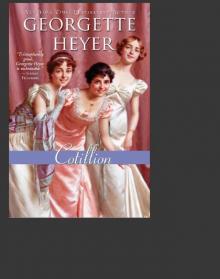 Cotillion
Cotillion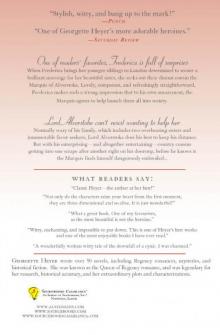 Frederica
Frederica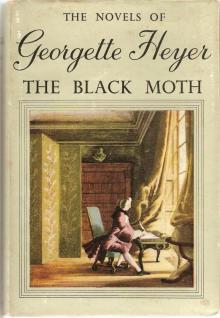 The Black Moth: A Romance of the XVIIIth Century
The Black Moth: A Romance of the XVIIIth Century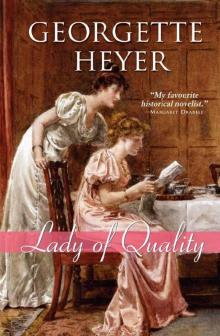 Lady of Quality
Lady of Quality Snowdrift and Other Stories
Snowdrift and Other Stories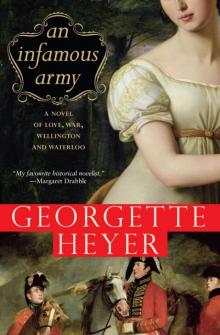 An Infamous Army
An Infamous Army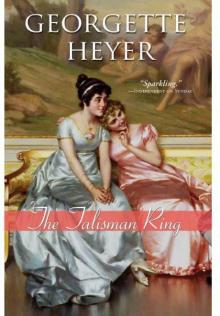 The Talisman Ring
The Talisman Ring Venetia
Venetia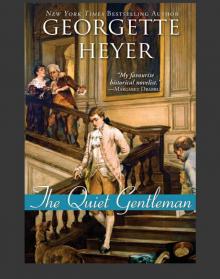 The Quiet Gentleman
The Quiet Gentleman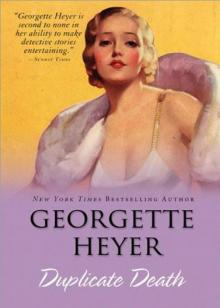 Duplicate Death
Duplicate Death Cousin Kate
Cousin Kate Black Sheep
Black Sheep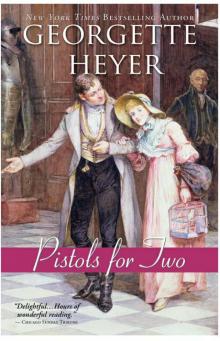 Pistols for Two
Pistols for Two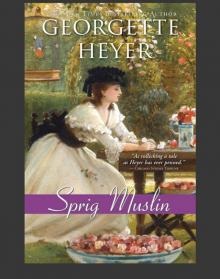 Sprig Muslin
Sprig Muslin No Wind of Blame
No Wind of Blame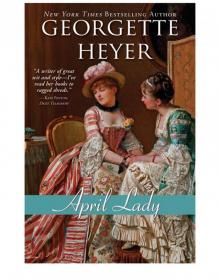 April Lady
April Lady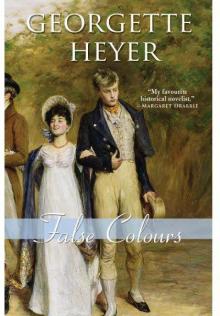 False Colours
False Colours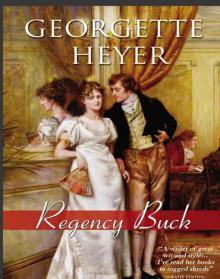 Regency Buck
Regency Buck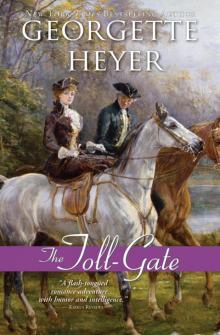 The Toll-Gate
The Toll-Gate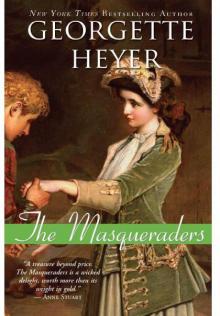 The Masqueraders
The Masqueraders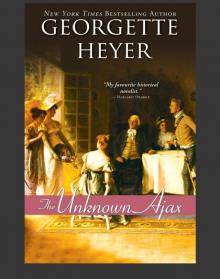 The Unknown Ajax
The Unknown Ajax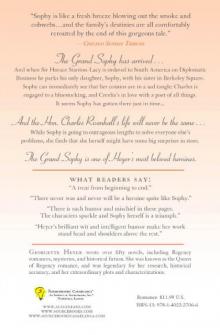 The Grand Sophy
The Grand Sophy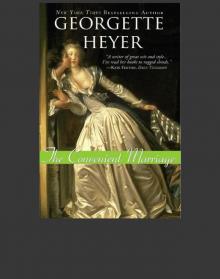 The Convenient Marriage
The Convenient Marriage Faro's Daughter
Faro's Daughter The Conqueror
The Conqueror The Foundling
The Foundling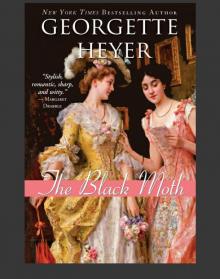 The Black Moth
The Black Moth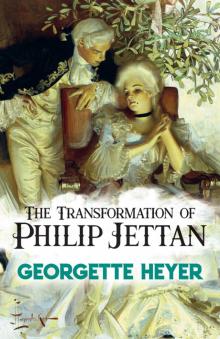 The Transformation of Philip Jettan
The Transformation of Philip Jettan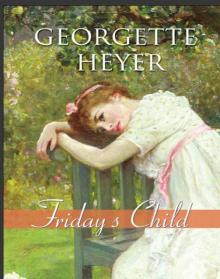 Friday's Child
Friday's Child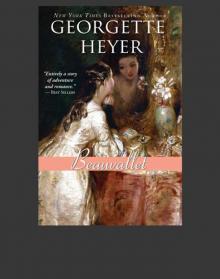 Beauvallet
Beauvallet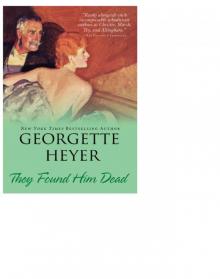 They Found Him Dead
They Found Him Dead Charity Girl
Charity Girl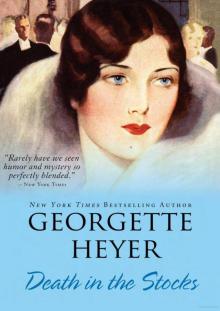 Death in the Stocks: Merely Murder
Death in the Stocks: Merely Murder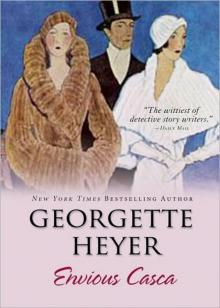 Envious Casca
Envious Casca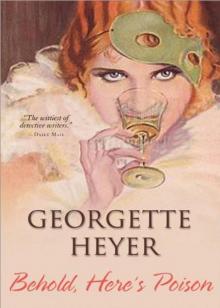 Behold, Here's Poison
Behold, Here's Poison Arabella
Arabella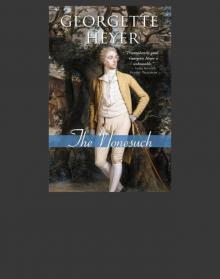 The Nonesuch
The Nonesuch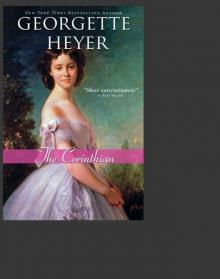 The Corinthian
The Corinthian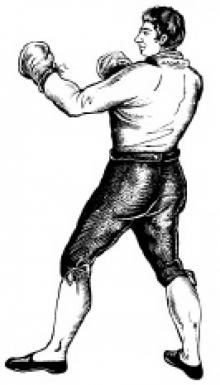 Jennifer Kloester
Jennifer Kloester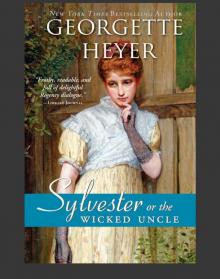 Sylvester
Sylvester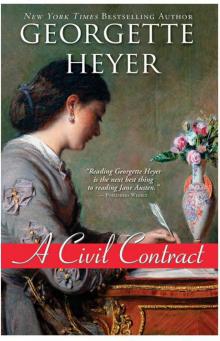 A Civil Contract
A Civil Contract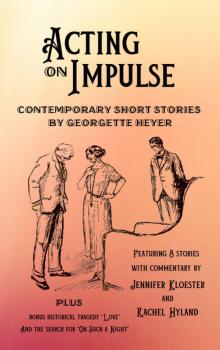 Acting on Impulse
Acting on Impulse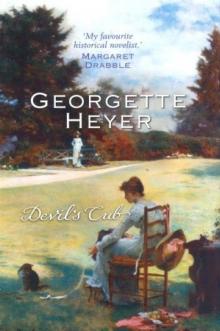 Devil’s Cub at-2
Devil’s Cub at-2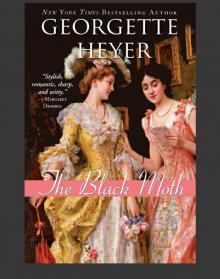 Black Moth
Black Moth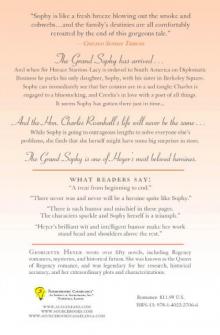 Grand Sophy
Grand Sophy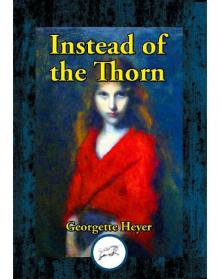 Instead of the Thorn
Instead of the Thorn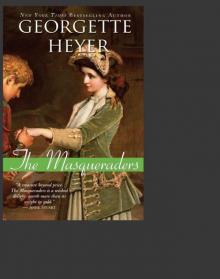 Masqueraders
Masqueraders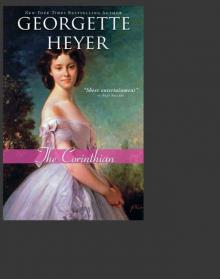 Corinthian
Corinthian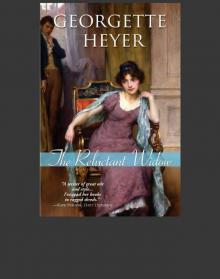 Reluctant Widow
Reluctant Widow